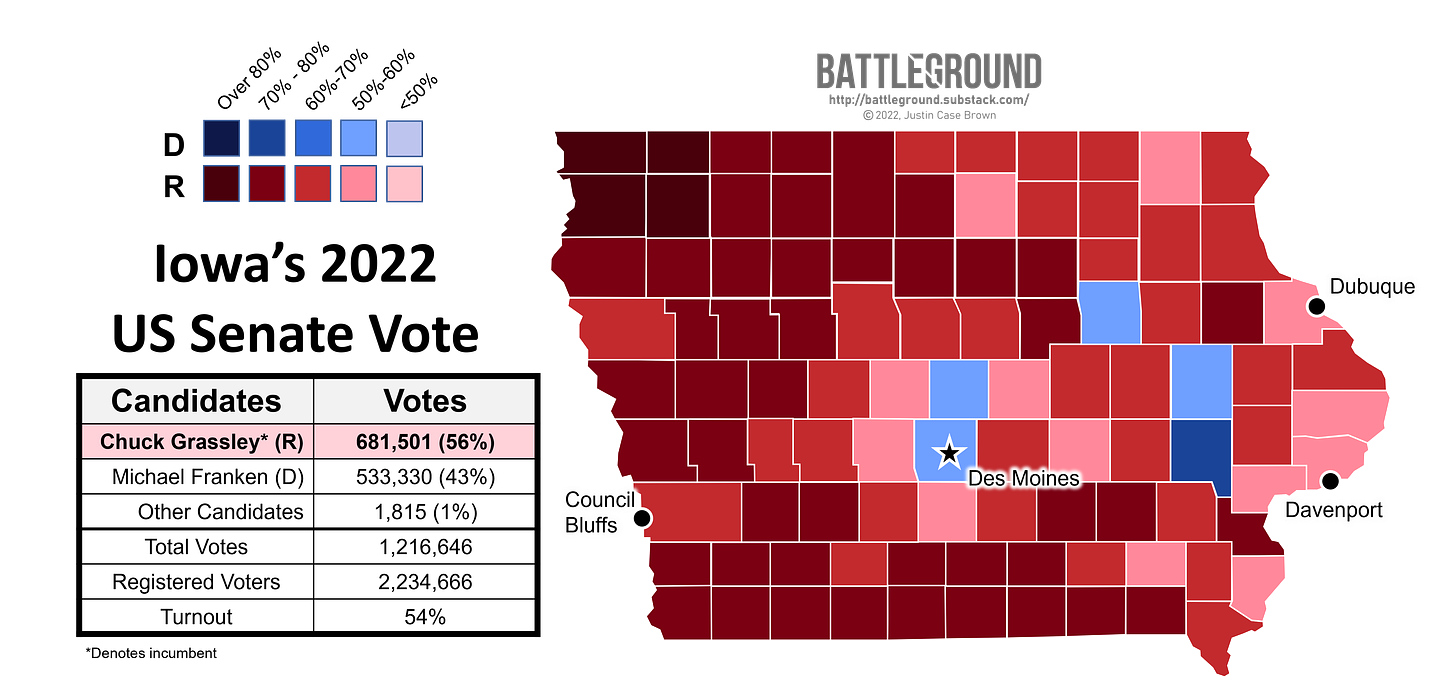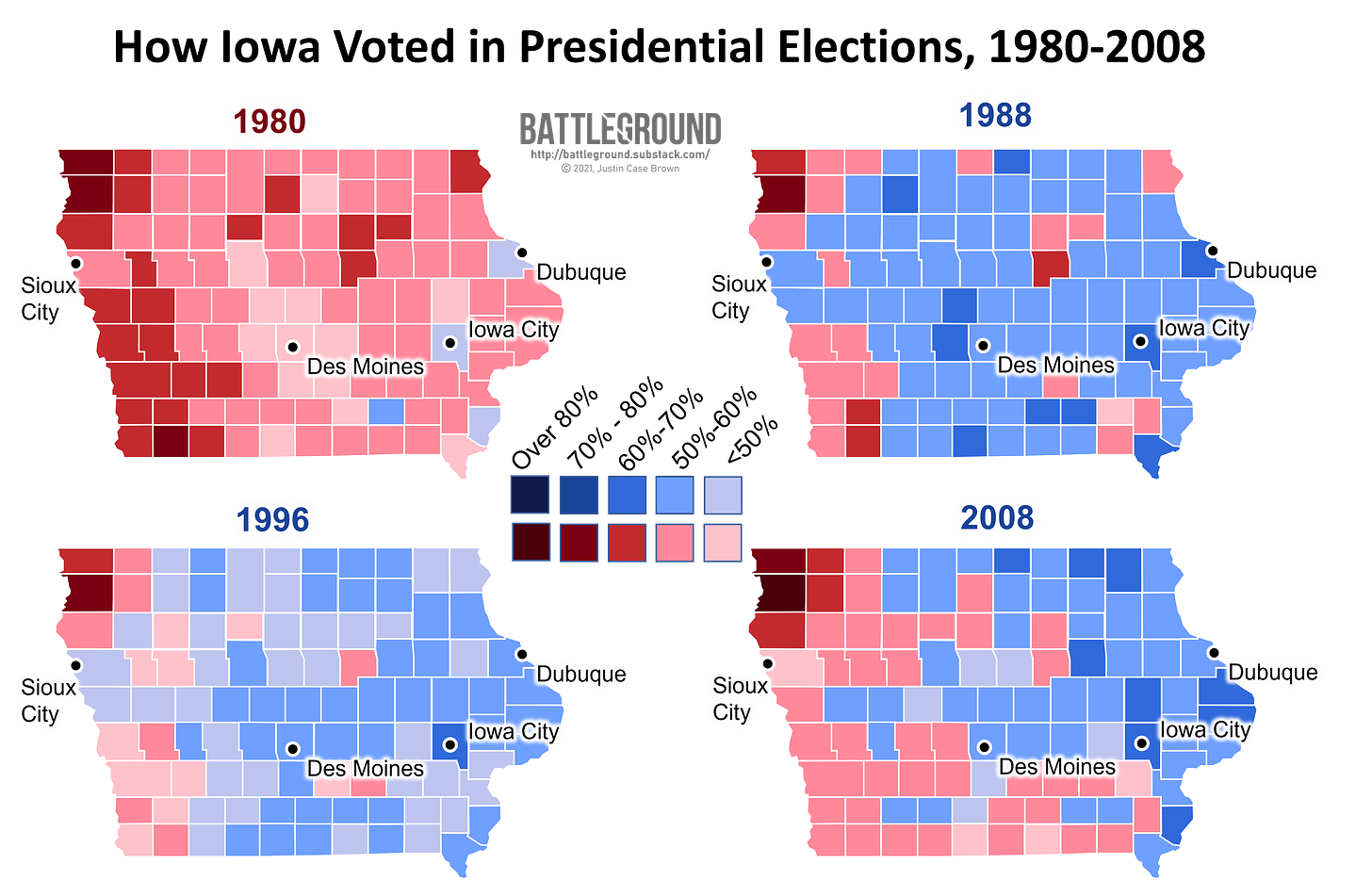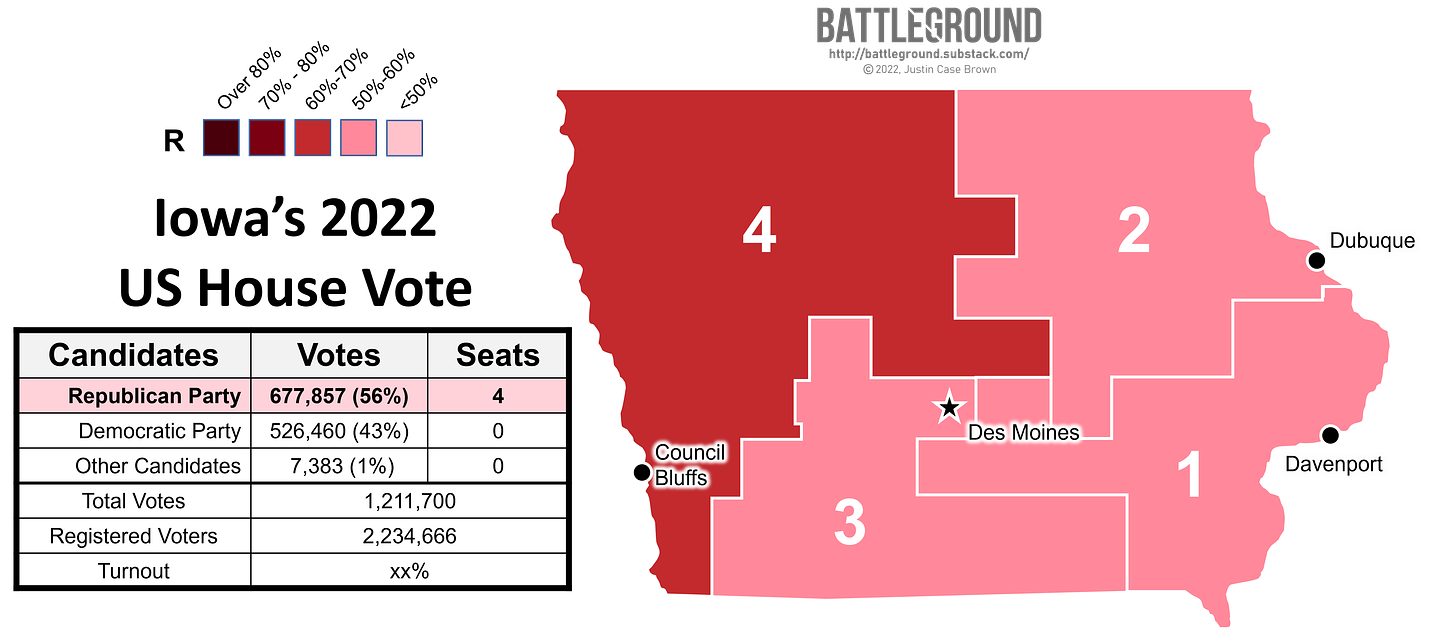Why Iowa Just Lost Its First In The Nation Caucus
Iowa's political realignment has led Democrats to head for the door.

Topline Takeaways
With the Biden’s blessing, Democrats are pulling out of Iowa’s first in the nation caucus and christened South Carolina as their first presidential nominating contest in 2024.
There’s a long laundry list of reasons Democrats have soured on Iowa’s outsized role in presidential politics in recent years. Among the most prominent: Iowa’s electorate is not representative of the country and the state’s caucus system is not viewed favorably by most within the party.
In addition, Iowa’s Democratic party has been decimated over the past decade. This cycle, Republicans swept all federal and statewide races except for one (State Auditor Rob Sand is the state’s sole winning Democrat this cycle.)
Iowa’s Political Realignment
After the 2022 elections it’s clear that Iowa has become a red state. This midterm cycle, Republicans swept all federal and statewide races except for one. (State Auditor Rob Sand is the state’s sole winning Democrat this cycle.) A lot of shifting factors are responsible for this realignment: for starters Iowa is diversifying at a much slower rate than the rest of the country. Nearly 90% of its voters are White Americans, making it the eighth Whitest state in the country. The Republican party has also shifted over the past decade to explicitly target White voters and candidates’ messaging has resonated with Iowa voters deeply.
To put Iowa’s political realignment in perspective, the state was once definitively a swing state where more than half of counties voted for Democratic presidential candidates. The 1990s also saw Democrats hold majorities in both chambers of the state legislature, later leading to Democratic governors throughout the early 2000s.
These voting trends changed when Trump came to town. In the 2012 election, Iowa voted 2 points to the left of the nation as a whole in supporting Barack Obama. During Trump’s first election in 2016, the state swung by a whopping 12-points, voting 10 points to the right of the nation in its support for Trump. While much of the country moved left between 2016 and 2020 Iowa continued its shift rightward, voting 12 points to the right of the nation in its support for Trump’s failed reelection.
This realignment is reflected in the state’s new congressional district map. Since Republicans held all of the power in Iowa’s most recent round of redistricting they redrew lines to create safer for seats for their candidates. As a result, this is the first time since 1994 where all of Iowa’s US House seats are represented by Republicans, despite the fact that 43% of voters supported Democratic candidates.
The state’s gubernatorial and US Senate races reflect similar trends. Incumbent Republican Senator Chuck Grassley won his eighth term in the Senate, breaking numrous national records. In winning his race, Grassley simultaneously became the second-oldest person ever to win re-election, the most senior member in the Senate, the longest-serving Republican Senator in history, as well as the most senior member of Congress. (Despite all of these accolades this race was actually his closest since first being elected in 1980.) Incumbent Governor Kim Reynolds also sailed to a smooth victory by a wider margin than Grassley. While a majority of Iowans approved of her job as governor during the height of the COVID-19 pandemic, her win was also due to Democrats’ inability to spread their candidate’s message.
Democratic gubernatorial candidate Deidre Dejear would have been the first Black female governor in the country had she won, so many would assume that she received national attention similar to Georgia’s Stacey Abrams. NOPE. In a name recognition poll less than a month before election day, barely half of Iowa voters knew who Deidre DeJear even was with 51% having no opinion about the candidate. At roughly the same point in the race, election watchers noted that her campaign had not bought a single television commercial despite the fact she was the presumptive nominee all year long.
Many believe the problem lies within the Iowa Democratic party as nonwhite candidates have been abandoned by the party before. While DeJear has only spoken positively of her state party counterparts, state legislator Ras Smith does not mince words. Smith declared his candidacy for governor early in the race and later pulled out after finding a “drastic disconnect between the current political system and the people.”
“I never expected to be given as equal a shot as my white counterparts. Because that’s reality. I’ve been a Black man in Iowa my entire life. What I didn’t expect was to be treated as insignificant by the donor class of my own party.”
Democrats Head for the Door
So let’s review, does a state with practically zero Democratic political leaders and one of the largest White populations in the country deserve to be the first in the nation to pick presidential candidates? Especially when the last time they did so, they created a national embarrassment that eroded trust in elections?
Joe Biden sure as hell doesn’t think so. The president recently made his preferences known to the Democratic National Committee: it’s time to ditch Iowa and its caucuses in favor of South Carolina. Most party leaders agree with Biden as they acknowledge that you can’t advocate for a diverse coalition of voters when you look to one of the Whitest states in the nation for electoral guidance. Really the only vocal opponents of the move are Iowa Democrats themselves: being stubborn about the shift after holding the first-in-the-nation status for over 50 years.
What about the Republican caucuses? As always, Republicans are defining themselves in opposition to Democrats. Sen. Joni Ernst mused that Democrats are giving the “middle finger to middle America” by moving their caucus date. Other GOP operatives are contemplating retaliation in the form of moving their caucus date up to as early as Halloween. As usual, this talk is all bark and no bite. There are no laws requiring both parties to hold nominating contests at the same time; many states stagger their party’s primaries and caucuses for a variety of reasons. So if Republicans want to tell their voters to go to the polls on Halloween, more power to them I guess? What they think or do has no bearing on the DNC’s decisions.
Leftover Links
After keeping Iowa open and kids in the classroom during the pandemic and being rewarded by voters for doing so, Gov. Kim Reynolds is a rising star within the Republican party. Hear her give the offical Republican repsonse to the most recent State of the Union address.
Learn about how the 1980s farm crisis helped turn Iowa into a swing state for nearly 40 years.




